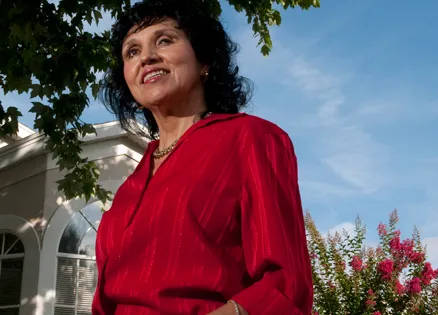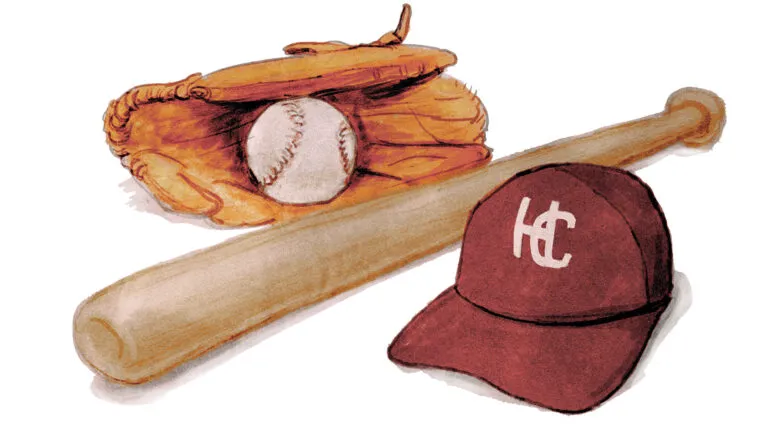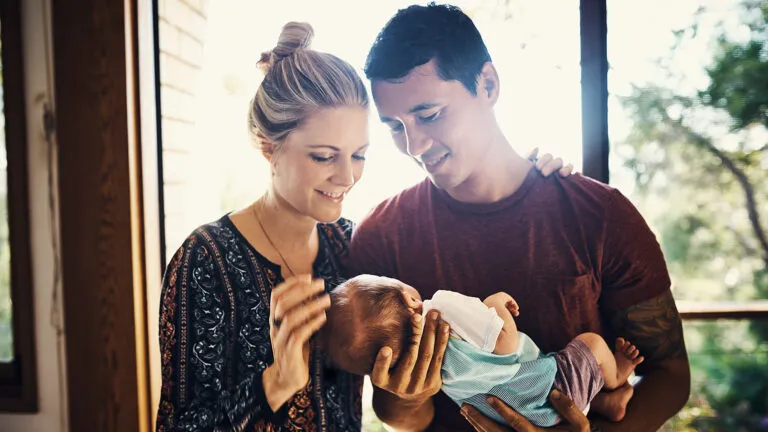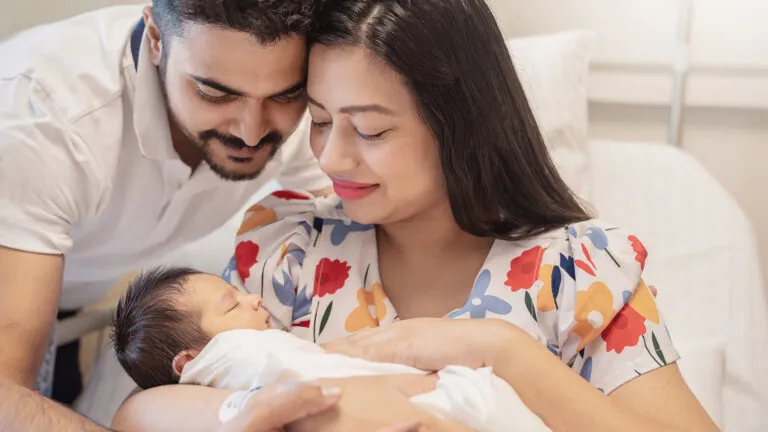I travel the country speaking to women about overcoming life’s challenges. I hear a hush come over the crowd as I tell of the journey that began for me some 30 years ago. I’ve done so many things I never dreamed of when I was younger—parasailing in Mexico, climbing a coconut tree in the Philippines, working as a Spanish-language interpreter, even writing a book about my life. It’s hard to believe that when I went blind at the age of 32 I was afraid even to put one foot in front of the other.
I’d been diagnosed in my late twenties with retinitis pigmentosa, an untreatable genetic degeneration of the retina that can lead to blindness. In my mind, people either lost their sight at birth or when they were elderly. It wasn’t something that happened in the prime of life. So when the doctor told me to prepare for losing my vision I dismissed his advice.
My world revolved around my family. Taking my three little boys—Jason, seven, Jeff, five, and Joe, three—to the playground, playing cars with them, reading them stories, giving them baths, picking out their clothes, grocery shopping, cooking delicious meals, doing laundry, cleaning and, at the end of the day, still having something left for Gene, my husband. I loved feeling needed and appreciated. And at night when I closed my eyes and prayed I felt God close by.
Surely he didn’t want me to go blind. Who’d admire Jason’s artwork if I couldn’t see? Tie Jeff’s shoes? Feed baby Joe? My identity would be gone. I couldn’t let that happen.
But my sight grew worse with each passing month. I prayed. Long, pleading prayers asking for God’s help. But they did little good. My peripheral vision faded first, like a camera aperture slowly closing in from all sides, until I could only see things directly in front of me. The boys’ scattered Matchbox cars became land mines. My steps grew shorter, more tentative. I had to focus to walk from one room to the next.
“There’s no cure for RP,” the eye doctor told me at one appointment. “But even total blindness is manageable. You’ll be able to do much more than you think. It will take time, though. You have to learn to see differently.”
If he was trying to give me hope it wasn’t working. My world was growing smaller, darker, more frightening. Even God seemed distant, unreachable. I’d given up driving. My house had become a prison. I felt helpless asking Gene if he could leave work early to take Jason to Cub Scouts. Calling my mom to take me grocery shopping.
“It’s okay,” Gene would say. “We’ll figure it out.”
But what was there to understand? Everything—the simplest task, like reading The Cat in the Hat to Joe—was becoming more difficult. I’d bend over to tie his shoes and misjudge the corner of a counter, banging my head. The boys were in constant motion. I always had to be on the lookout. With my coaching they had learned to place things they wanted me to see in front of me, to be patient when they called for my help. But I wanted to be there for them, not the other way around. I’d find myself staring into their faces, trying to memorize every detail. I would never know how their faces changed as they grew into teens and adults, never see their girlfriends, never watch them cross the stage at graduation, never be able to picture any of the special moments in their lives.
My view of the world shrank to the size of a keyhole. As long as I can see just a little, I’ll manage, I told myself. I got the boys their breakfast each morning, my fingers measuring the cereal and milk as it poured into the bowls. I counted as I carefully went up the five steps to the second floor. I reached out to touch walls or furniture as I walked. But I barely slept at night, worried that if I closed my eyes I might never see again.
One morning I awoke in my bed to a dark gray haze all around me. I raised my hand in front of my face. Nothing. Not even a shadow. Gene had left for work. I felt lost, like I was trapped alone in an impenetrable fog.
“Please, God,” I heard myself crying out in the darkness. “I need your help. I need to know you are there.” But I felt no comfort in the stillness around me. I’d been dreading this day, yet not once had I allowed myself to think about how I would cope when it finally arrived. That would have been like giving in.
I threw off the covers and groped for the wall leading out of the bedroom. I heard the sounds of the TV and the boys’ laughter from the family room. What time was it? I listened closer. They were watching Mister Rogers’ Neighborhood. There was still time to get Jason and Jeff ready for school. I felt my way down the stairs. One. Two. Three. Four. Five. It was odd how familiar it seemed.
“Who wants some breakfast?” I called out. The boys scampered into the kitchen, the sounds of their footsteps each so distinctive. I’d never noticed that before. I ran my fingers across the cabinet and grasped the knob. I opened it, found the cereal and poured it into four bowls. Then added the milk. Cautiously I reached for the fruit bowl, pulled out a banana, peeled it and sliced it.
Now the hard part—transporting the bowls to the table. I took slow steps and set a bowl in front of each chair. I could feel my heart pounding. I’d done it!
Then it was time for my older boys to leave for school. I bent down and hugged them. I could feel their little hands pressing into my back, their faces so warm against mine. I didn’t have to see them to feel their love. It enveloped me—an intense, incredible feeling of comfort.
I sent the boys off to the bus and found my way to the couch. I had to think this through. “Mommy needs to rest,” I told Joe. I could hear him playing cars beside me. Then I felt something hard being pressed into my hands. “Read to me,” Joe said as he crawled onto my lap. I’d figured out breakfast, but this was the one thing I couldn’t do.
I hesitantly opened the cover, trying to remember the words to one of his stories. “The sun did not shine,” I said slowly. I felt him take the book and turn it in my hands. I’d been holding it upside down! “It was too wet to play,” I continued, my voice cracking. I stumbled on, making a complete mess of the story. But Joe didn’t seem to notice. When I finished he said, “Thanks, Mom. I liked that one the best.” He climbed off my lap and went back to his cars. The warm comforting feeling again swept over me, a love that I knew wasn’t coming only from my son.
Although I couldn’t do things the way I’d always done them, what mattered most to me—the love of my family, the presence of God—hadn’t changed. In fact, I felt all
of that more intensely than ever. I’d been so fixated on not losing my sight that I’d been blind to the fact that God had been guiding me all along, preparing me for this. I wasn’t worried anymore about how I was going to do everything. I knew I’d have plenty of help figuring it out.
Slow adjustments made me stronger. Each week I learned how to do something new. I organized and made a mental map of everything in my house. Created coding systems. I wrapped rubber bands around the flour and sugar bags to tell them apart, one for sugar, two for flour. I realized I could tell spices by their smell. It wasn’t long before I could easily put my hands on whatever I needed in the kitchen. One night I surprised Gene and the boys with a spaghetti dinner.
I could hear Joe’s untied shoelaces dragging across the kitchen tile. Could feel when Jeff’s face was dirty. My nose told me when Jason was wearing the same stinky socks two days in a row.
Where my failing eyes had once seen hurdles impossible to cross, now I relished the challenge of finding a path around them. My world expanded with each step I took.
Gene gave me the Bible on tape, and I joined a Bible study. With the use of a screen reader, I began “reading” on my computer. And writing on my own wasn’t off-limits either! That’s when I began sharing my story with others. Was there anything I couldn’t do?
One day while I was unloading the washing machine I overheard Joe tell a playmate, “My mommy has eyes at the end of her fingers.” I chuckled. It was true. My sight was gone, but my vision was clearer than ever.
I marveled at how my sons grew into young men. Rather than bend over to kiss their cheek, I stood on my toes to reach them. I was there at their football games and lacrosse and wrestling matches. I’d hold my husband’s hand and climb into the stands. I cheered when I heard the announcer mention my sons’ names.
And when I heard their names called out as they walked across the stage at graduation, first Jason, then Jeff, then Joe, my eyes filled with tears. I experienced it all so vividly. My world didn’t stay dark when I went blind. With God, it grew brighter, rich with hope. After all, it isn’t only with the eyes that you see.
Find more on personal growth.





